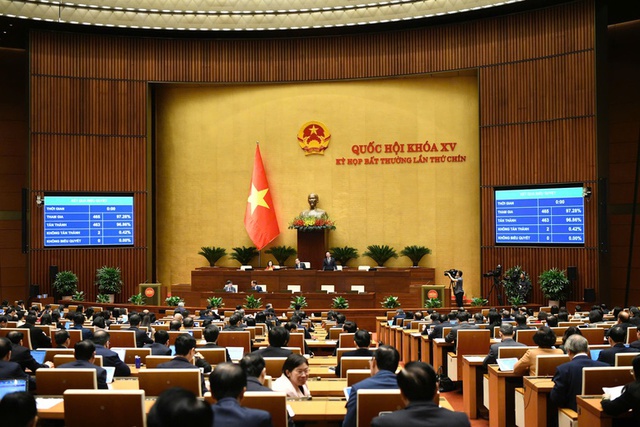Legislators pass revised Law on Government Organization
VGP - The National Assembly on February 18 passed the Law on the Organization of the Government (revised) at its ongoing 9th extraordinary session.

The law, comprising five chapters and 32 articles, shall come into effect from March 1, 2025.
The amended law clarifies the cabinet's duties along several key dimensions such as submitting fundamental and critical matters to the National Assembly for decision, presenting issues within the National Assembly Standing Committee's jurisdiction for resolution, proposing amnesty decisions to the President in accordance with the regulations, and executing responsibilities within the Government's authority.
A notable innovation in the revised law establishes the Government's unified state management across all sectors and domains. The cabinet will assign state management scope to ministries and ministerial-level agencies while delegating authority to their respective leaders.
The revised law allows the Government to determine policies for sectoral, regional, and local development, except those under the authority of the National Assembly and local administrations. These policies must align with the Party's directives, national socio-economic development strategies, and fundamental targets and missions already approved by the legislature.
For matters delegated to local authorities, these governing bodies will independently make decisions, implement programs, and bear responsibility for the outcomes within their jurisdiction.
On February 17, lawmakers adopted the Law amending and supplementing several articles of the Law on the Organization of the National Assembly.
The new law amends and supplements 21 new articles and abolished 17 articles compared to the previous version.
Notably, the term extraordinary session is changed to irregular session.
In addition to two regular sittings each year, the legislature will organize irregular sessions at the request of the President, the National Assembly Standing Committee, the Prime Minister, or at least one-third of the deputies. These sessions are intended to promptly address urgent matters within the National Assembly's authority, thus meeting the needs of socio-economic development, national defense, security, and foreign affairs.
Additionally, the law does not specify the exact number or names of the legislature's agencies. This approach is consistent with the ongoing policy of streamlining the organizational apparatus, ensuring that the structure of the agencies aligns with their functions, tasks, and authority.
Among the 10 National Assembly agencies currently, eight are directly impacted by the restructuring, while two new agencies have been established./.

